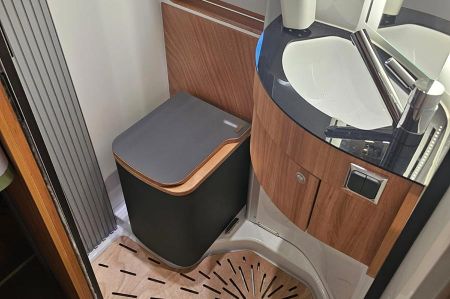Current ecological trend – the dry separation toilet
- Written by Portal Editor
The tour of the trade fair not only shows the major innovations of the well-known camping vehicle manufacturers, but also the diverse work of small companies that come up with technical solutions that are not known to everyone.
When it comes to camping, but also in many other life situations, going to the toilet in your own vehicle is a problem that has not yet been completely solved. Although there are numerous manufacturers of water-flushing chemical toilets, that is precisely where their problem lies: the use of chemicals. At the latest when it is emptied, the problem of disposal becomes apparent, which can only be carried out in specially designed tanks, which in turn leads to high investment sums on campsites, which in some places are not financially feasible. Many campsites have separate toilets marked “chemical toilets”. However, this is because the camping toilets should not be emptied in the normal toilets due to the odor and for hygienic reasons. So what can the solution look like?
Dry separation toilets replace the use of chemicals
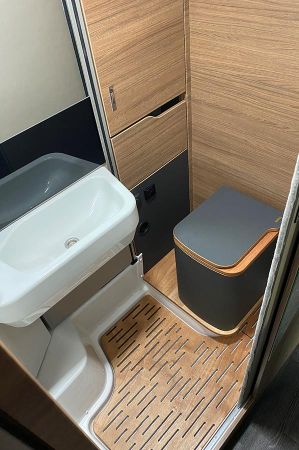 Every camper has probably already dealt with the subject of the toilet, as just going to empty it is unpleasant and sometimes quite difficult. If you only briefly deal with the problem of feces, it quickly becomes clear that it is only the mixing of urine and feces that causes an unpleasant smell and therefore requires the use of chemicals. If these two waste products of human existence are separated, the problem should be solvable, right?
Every camper has probably already dealt with the subject of the toilet, as just going to empty it is unpleasant and sometimes quite difficult. If you only briefly deal with the problem of feces, it quickly becomes clear that it is only the mixing of urine and feces that causes an unpleasant smell and therefore requires the use of chemicals. If these two waste products of human existence are separated, the problem should be solvable, right?
Separating toilets do not require the use of water for flushing and certainly no chemicals to control odours. In these toilets, a special separator insert under the toilet seat ensures that urine and feces are collected in separate containers. Since the enzymes in the feces cannot break down the urea into ammonia compounds, no bad smells form. To make disposal easier, we recommend hanging a bag in the solid’s container. Additional grit can also be added to the container to bind the moisture and keep the contents dry, because everyone knows the principle of cat toilets in the house.
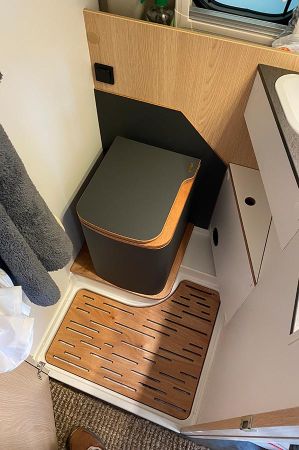 This reduces the formation of odours and the system works completely without water. The toilet paper ends up in the solid’s container. Litter can be added so that the solids dry more quickly, for which sawdust, small animal litter, coconut fibres, Terra Preta humus, litter with activated carbon and even coffee grounds can be used.
This reduces the formation of odours and the system works completely without water. The toilet paper ends up in the solid’s container. Litter can be added so that the solids dry more quickly, for which sawdust, small animal litter, coconut fibres, Terra Preta humus, litter with activated carbon and even coffee grounds can be used.
The urine tank can easily be emptied at a designated disposal station or into a toilet. Once you have placed a bag in the waste container, it can simply be disposed of in the trash. You can even empty the container into the compost if you have used compostable bags and disposal is permitted at the respective location.
You can also put the toilet paper in the container to solidify, because it absorbs liquid - like the litter. Any normal toilet paper can be used for the separating toilet.
Dry separation toilet from BoKlo – universally designed and adapted
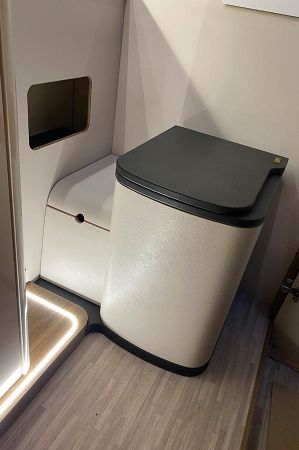 During the trade fair we were lucky enough to meet BoKlo founder and owner Sven Bockermann, who did not invent the principle of the dry separation toilet, but optimized his models down to the last detail. The wooden cladding of the toilets creates a pleasant contrast to the plastics that you can otherwise buy on the market. And what's in the toilets for camping and outdoors does justice to the beautiful design in every respect.
During the trade fair we were lucky enough to meet BoKlo founder and owner Sven Bockermann, who did not invent the principle of the dry separation toilet, but optimized his models down to the last detail. The wooden cladding of the toilets creates a pleasant contrast to the plastics that you can otherwise buy on the market. And what's in the toilets for camping and outdoors does justice to the beautiful design in every respect.
Sven Bockermann: “Many of our customers appreciate the ecological and practical advantages of a separating toilet, not just in classic caravans, vans and motorhomes - not least because of the more convenient disposal, which can simply be placed in the bag in the regular rubbish. We also offer solutions as a mobile toilet for taking with you on the go or on the construction site.
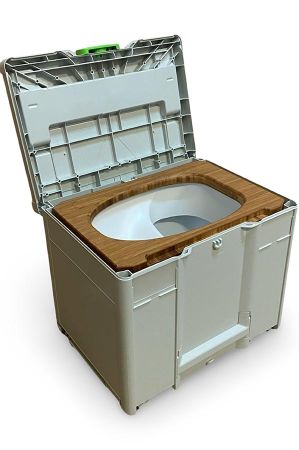 When manufacturing the BoKlo dry separation toilets, we attach great importance to regionality, which means: from the first screw to the glue, even the packaging to the wood, we make sure that these individual items, which ultimately lead to our BoKlo dry separation toilet, come from surrounding manufacturers or are sourced from dealers, so a large part of the value chain remains in the region and jobs are created or retained.
When manufacturing the BoKlo dry separation toilets, we attach great importance to regionality, which means: from the first screw to the glue, even the packaging to the wood, we make sure that these individual items, which ultimately lead to our BoKlo dry separation toilet, come from surrounding manufacturers or are sourced from dealers, so a large part of the value chain remains in the region and jobs are created or retained.
Our separating toilets are made by hand in our factory in Wuppertal and sold here directly by the manufacturer to our customers.”
A few years ago, Sven Bockermann wanted to retrofit his expedition vehicle with a dry separation toilet, but he couldn't find a product that completely convinced him and for this reason he started developing it himself.
How did you come to develop your own separate toilet?
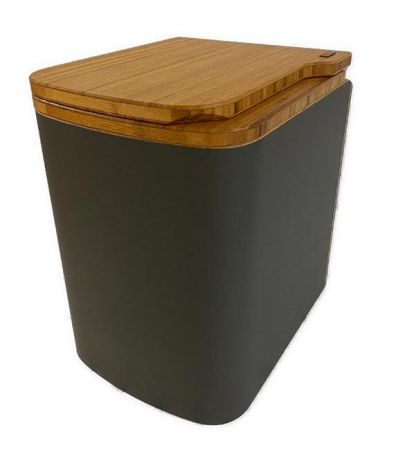 Separating toilets should be clean, not smelly, easy to dispose of and blend in visually with the interior of the vehicle or room.
Separating toilets should be clean, not smelly, easy to dispose of and blend in visually with the interior of the vehicle or room.
Since March 2021, interested customers have been able to purchase dry separation toilets for motorhomes, caravans and vans, which are custom-designed for the respective vehicle by BoKlo in its own factory in Gevelsberg and equipped according to customer requirements.
More and more people are deciding to retrofit a dry separation toilet because, even after years of use, they haven't really gotten used to the factory-installed toilet or chemical toilet. Separating toilets are a great solution, especially in tight spaces: In addition to being almost odor-free thanks to the separation of solids and liquids (without any chemicals), the compact separating toilet also fits in visually.
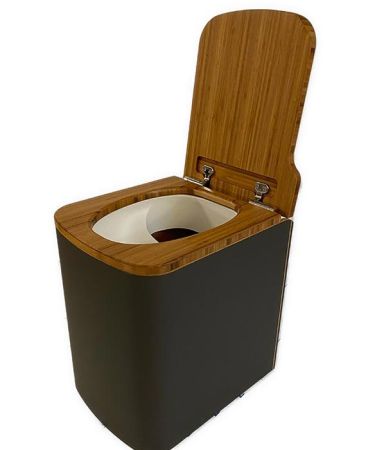 Wood also makes BoKlo's separation toilets look really nice, and all of the components and even the glue and screws are produced in the region. A pleasant contrast to the usual plastic.
Wood also makes BoKlo's separation toilets look really nice, and all of the components and even the glue and screws are produced in the region. A pleasant contrast to the usual plastic.
By the way: There are also toilets to take away. You can also find the right toilet for the garden house at BoKlo. The separation toilet is a strong option for anyone who works on the go, such as craftsmen or landscaping builders. Outdoor enthusiasts such as anglers, hunters and nature photographers have long since discovered the advantages for themselves - as have outdoor athletes such as cyclists, canoeists and climbers who always have their own toilet with them in their car.
Simply book an appointment for advice at the factory in Gevelsberg between Hagen and Wuppertal via the website: This email address is being protected from spambots. You need JavaScript enabled to view it.
BoKlo
Sven Bockermann
Augustastrasse 111, 42119 Wuppertal, Germany
Telephone: 004920294649846
Email: This email address is being protected from spambots. You need JavaScript enabled to view it.
Please read as well:
Mobile working in Fendt - adfendture - Connect
For mobile working too - Alpine Cross Cabin Signature
